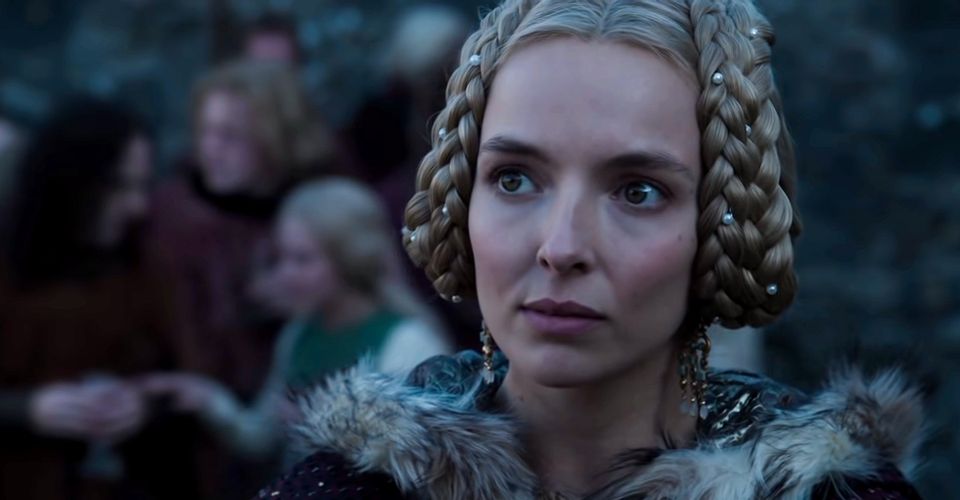The Last Duel Ending Explained

Warning: SPOILERS ahead for The Last Duel. This article also discusses rape and sexual assault.
The Last Duel is the latest directorial endeavor from Ridley Scott; here’s the ending of the medieval drama and Marguerite’s fate explained. The Last Duel is based on a book by Eric Jager called The Last Duel: A Story of Trial by Combat in Medieval France, which in turn is based on true events. The Last Duel’s main characters did exist, and much of their concerns and actions shown in the film did in fact happen. Scott, Affleck, Damon, and Holofcener took care to ensure many medieval customs and practices were displayed accurately in the film.
The Last Duel has earned positive reviews due to its thought-provoking storyline, unique structure, and strong acting in what is arguably a return to form for Ridley Scott. The film is also significant in that it’s a reunion for the screenwriting team of Ben Affleck and Matt Damon. The pair envisioned a story told in three parts – one from the perspective of each of the film’s lead characters. Smartly, the pair also enlisted Nicole Holofcener to write the perspective of Marguerite de Carrouges, a third act that brilliantly knocks down the illusions set up by the previous two takes.
While the film’s three-part approach to storytelling led to a satisfying conclusion, the warring perspectives of Jean de Carrouges, Jacques le Gris, and Marguerite de Carrouges at times muddle certain contextual aspects of the story. While Marguerite’s account of what happened to her in the film is certainly the truth (as the film takes care to point out with a title card), there are aspects of de Carrouges’ rivalry with le Gris and Marguerite’s treatment that warrant extra fleshing out. This is especially so as they also relate to the true story of The Last Duel.
Why Was The Land Le Gris Took So Important To De Carrouges?

In the first act The Last Duel, Jean de Carrouges is shown to be upset over losing land to le Gris for very chivalrous reasons, but this is revealed to be far from the truth. What actually transpired was a battle of wants, customs, and legality that set the stage for the rivalry between de Carrouges and le Gris. Jean de Carrouges believed the land – the estate of Aunou-le-Faucon – was rightfully his due to the fact that Marguerite’s father, Robert de Thibouville, promised to include it as part of de Carrouges’ dowry. As women were essentially regarded as heir-producing property at this time, a dowry was a gift of additional wealth or land meant to make a potential bride more desirable. As an heirless widower unable to pay his debts, Matt Damon’s character already risked diminishing his name by marrying the daughter of a disgraced man, and wanted more “value” out of the arrangement.
The land in question, however, was seized by Count Pierre in lieu of payment for de Thibouville’s outstanding debts and gifted to Jacques le Gris before de Carrouges was married – therefore removing any claim de Carrouges may have had to it. Because Jean de Carrouges is portrayed as a man with a very strict internal code of honor, this move rankled him despite the fact it was technically not illegal. De Carrouges sees things in black and white, and the idea that Jacques le Gris benefited from something that was ethically wrong in de Carrouges’ eyes drove a wedge between him and Adam Driver’s character, in the first major splintering of their friendship. Of course, de Carrouges is also shown to be hotheaded, as well as broke after the plague carried off half his staff and crops, so his claims of honor and rights could also simply be disguising the fact that the financially bereft man felt slighted as well as desperate.
Why The Court Didn’t Believe Marguerite’s Story

One of the more surprising scenes in The Last Duel came when the court didn’t believe Marguerite de Carrouges’ account of her rape. This is far from unbelievable, however, given views toward women at the time (and, sadly, today). As the film makes clear, the rape itself is viewed as a property crime against Jean de Carrouges rather than a horrific act done to Marguerite herself. Marguerite’s mental state, visible distress, and well-being were simply not of concern to the court unless they directly impacted Jean de Carrouges. As shown earlier in the film with a scene between le Gris and another woman, a woman’s consent was hardly a thing men felt they had to consider at the time.
Another major issue for Marguerite in Ridley Scott’s movie was that she became pregnant after being raped by le Gris – though the film makes clear she could have become pregnant as a result of similar treatment by her own husband shortly after. There was a prevailing belief in the 14th century that women had to enjoy sex in order to become pregnant, and by medieval logic, if Marguerite enjoyed her counter with le Gris it couldn’t have been rape. This is precedent for this way of thinking shown in an ancient Greek theory (the Galenic model of reproduction) that stated both partners needed to enjoy sex in order to conceive a child.
Why Le Gris’ Body Was Stripped Naked & Strung Up

Le Gris was not only killed by de Carrouges in the duel, but his dead body was subsequently stripped naked, dragged by horses through the town square, and hung upside-down for all to see. This wasn’t given much context by either Ridley Scott or the script, and felt almost like an unnecessary coda to Jacques le Gris’ demise. However, this event actually occurred following the real Jacques le Gris’ death, and it was a deliberate effort to further sully le Gris’ name and reputation.
As there was no separation of church and state during the medieval era, this act ties into a belief called “iudicium Dei” – the judgment of God. It was believed at the time that in any trial or ordeal to determine guilt, God would protect the innocent from harm – therefore, whoever won the duel between Jean de Carrouges and Jacques le Gris would have been proven innocent. Le Gris lost the duel, meaning God saw his guilt and failed to protect him. In the eyes of the court and those watching, le Gris instantly became nothing but a common criminal. Though Ridley Scott always crafts memorable deaths, The treatment of le Gris’ body after the duel, in this case, was meant to reflect his new status as a criminal and bring shame to the man and his name.
Why Marguerite Was To Be Burned At The Stake

Of course, The Last Duel’s questionable justice system is revealed to be even worse when the focus is on Marguerite de Carrouges. Just as le Gris was determined to be guilty by virtue of his death, a Jacques le Gris victory would have been seen as proof to all present that the case against him was false. As Marguerite de Carrouges was the one who leveled a charge against le Gris, this would have revealed her to be a liar according to, again, the medieval belief of iudicium Dei, thus allowing her to be punished for bearing false witness. Though punishments for bearing false witness in 14th-century France weren’t always as severe as being burned alive, that this was to have been Marguerite’s fate was another sign of how the value of men was judged as being of immensely greater worth than that of women in the era. Both the fate of execution and the horrific manner of it was as much about punishing a woman for damaging a man’s reputation as it was about lying. Even if she hadn’t been sentenced to burn at the stake, Marguerite de Carrouges’ life certainly would have been over one way or another had her husband lost his duel.
What The Final Close-Up On Marguerite’s Face Means

Director Ridley Scott ends The Last Duel on a peaceful scene in which Marguerite watches over her growing son. The camera focuses on Marguerite’s face before the film fades to black, and while the scene may be open for interpretation, what it does and does not show is certainly notable given the film’s focus on perspective. Key to the scene are Marguerite’s location – she is in a field, with a castle in the background – and the notable absence of Jean de Carrouges. Thus, this scene gives Marguerite a moment of rest from the oppressive roles that politics, social norms, and men have played in her life up to that point. This idea is underscored by the title cards that follow it, which reveal that Jean de Carrouges died in battle a few years after the duel and that Marguerite never remarried.
The Last Duel’s Real Message & Meaning Explained

Speaking to Vanity Fair, Matt Damon and Ben Affleck’s The Last Duel co-writer Nicole Holofcener said ” …it actually is a very feminist movie. We immediately engaged some #MeToo groups and Geena Davis’s group to advise us, to listen to us.” The film does indeed stand out among other medieval epics as having a fresh perspective that uses its story to shed light on issues of rape and misogyny. It does so in the first place due to its unique three-perspective structure which smartly saves Marguerite de Carrouges’ story for last. While there is plenty of information about both Jean de Carrouges and Jacques le Gris in the historical record, Marguerite’s story is much less fleshed out – further reinforcing the concept of women as secondary players at the time. The Last Duel finally gives Marguerite a voice, and one that paints a very harsh and accurate picture of the men in her life. It also gives nuance to her story that, unlike many other films set in the medieval era, gives an accurate and thought-provoking account of how women were treated at the time, but also today.
The Last Duel’s structure also speaks to how modern times and how even today, women are still fighting an uphill battle to be heard when it comes to accusations of rape and sexual harassment. Recent stories of powerful, high-profile men being fired from a project or taken to court for sexual assault may create the perception that it’s easy in a post-#MeToo era for women to receive justice, but that’s an incorrect assumption. In reality, it’s still incredibly hard for women to speak up about having been raped or sexually assaulted. It often does not go a woman’s way in the court of public opinion, nor in actual court, where dangerous men still so often get off on technicalities; just look at the recent example of Bill Cosby being let out of prison due to a loophole.
The movie’s structure also illustrates how, even today, in any he said/she said scenario, the tendency is to doubt the woman’s story but to take men more seriously. In de Carrouges’ mind, he believes he is a loving husband and an honorable man who stands up for Marguerite in her hour of need; in reality, he doesn’t immediately believe her and even then only views it in terms of le Gris having slighted him. Le Gris sees himself as a highly desirable figure – most disturbing is how in his account of the rape of Marguerite, she is almost playful and not necessarily unwilling. Le Gris even mentions her “customary protests” later on in the film, but his perspective frames it as though Marguerite had been sending mixed signals. Marguerite’s perspective knocks down all illusions and focuses on her struggle and mistreatment in a male-dominated world. The framing of the triple perspective illustrates how men of any era justify appalling actions and how the burden is always on women to achieve a higher standard of proof, as well as the effects of internalized misogyny. Hopefully, The Last Duel will also inspire future films to be as thoughtful.
About The Author

















